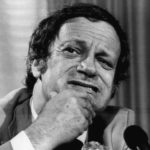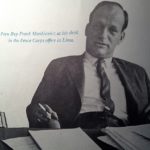Peru’s First Peace Corps Staff
 Frank Mankiewicz was born in New York City into a family whose members are importantly involved in the American cinema. His father, Herman J. Mankiewicz was an Academy Award winner for the screen play, “Citizen Kane;” his brother, Don, wrote the prize novel, “Trial;” and the film version of “I want to Live;” and his uncle, Joseph, directed “Cleopatra” in the Elizabeth Taylor version, as well as, “All About Eve.”
Frank Mankiewicz was born in New York City into a family whose members are importantly involved in the American cinema. His father, Herman J. Mankiewicz was an Academy Award winner for the screen play, “Citizen Kane;” his brother, Don, wrote the prize novel, “Trial;” and the film version of “I want to Live;” and his uncle, Joseph, directed “Cleopatra” in the Elizabeth Taylor version, as well as, “All About Eve.”
Frank got in one year at Haverford College before both World War II and his 18th birthday came along. He enlisted as a private and was sent to the Army Special Training Program, “because, I assume, I spoke French. Anyway, the Army had a rule—if you knew one language, you had to learn another, and when I arrived at City College of New York for ASTP, they assigned me to a Spanish class. I studied Spanish seven hours a day for six months, went back to the infantry and didn’t speak it again for 18 years.”
The infantry meant a mortar company with the 69th Infantry Division which went into combat across France, Belgium and Germany. “I wound up in the battalion which met the Russians at the Elbe. I, personally, didn’t meet the Russians. My jeep had a flat tire that day.”
After eight months in Bremen with Armed Forces Radio, he was discharged as a T-5 and went home to UCLA where he edited the Daily Bruin and graduated in 1947 with a degree in political science.
On to Columbia University, he took an M.A. in journalism in 1948 and went to work for six months as Washington correspondent for a collection of West Coast dailies. The next year he spent as city editor of the Santa Monica Independent. He was on leave of absence in Europe writing an article on atomic energy in Europe (which he sold to the North American Newspaper Alliance) when the Independent folded.
“I came back to Los Angeles and worked as a free-lance writer—ghost writing and selling to magazines, ran (unsuccessfully) for the State Assembly from West Los Angeles, joined the Pacific Southwest Regional Staff of the Anti-Defamation League for two years as Civil Rights Director.
The collapse of the Independent and the subsequent view of the staff kicked out onto the street had given me a depressed view of journalism. I decided I had better learn a trade.”
In 1952, Mankiewicz enrolled in Boalt Hall, the University of California’s School of Law. In his final year there, he served as articles editor of the California Law Review. He passed the State bar examination in 1955 and joined the Beverly Hills firm of Kaplan, Livingston, Goodwin and Berkowitz, and there he remained for six years—until he joined the staff of the Peace Corps on December 4, 1961.
“I found that the practice of law in Los Angles was fascinating,” he has since said. “I was well established there—everything was going fine. I was an early Kennedy supporter, and as the administration was being put together, I began to get restless. It occurred to me that there might be more important things in the world than what I was doing. The idea of the Peace Corps just bowled me over. I went out to El Paso where I met Sargent Shriver and spent one day with him. I came away glassy-eyed, and I think I have been that way ever since.”
Mankiewicz went to Peru as Peace Corps Director in January, 1962, where he negotiated an expansion of what would had been a small opening program, and then, in the next six weeks, laid the groundwork for three more programs. Back to Washington he went to work on the selection and training of Volunteers and the recruitment of additional overseas staff.
He participated in the final selection of Peru One and was about to step on a plane for Lima, when, on July 18, a military junta took over the government of Peru.
The Volunteers scheduled to depart on August 1 were delayed until the situation clarified—they finally departed on September 7. By the end of November, the first groups had arrived in the country for a total of 190 Volunteers—52 of them in rural community action,93 in urban community development and 45 in a health program.
On August 20, Mankiewicz flew down to the office which had been manned in his absence by Deputy Director William Mangin and Associate Director for Management Darwin Bell.
Research Document: Who’s Who in the Peace Corps Overseas Administration (1963)
The photographs are by Rowland Scherman, Paul Conklin and Jim Walls, first photographers for the agency.
John C. With all these essays about early PC staffers, I hope you won’t overlook founding PC staffer and New Mexico native son, Andres Hernandez. He would write a chapter in those earliest days (Dominican Republic), which I think has never been equalled. A story worth telling.
“Andy”, as he was affectionately known by his volunteers, died here in New Mexico 26 Feb 2011, at age 98, and was interred, alongside his wife, at Santa Rosa. At my urging, the State Senate adopted a memorial in his memory.
Andy, to the end of his life, would travel to attend RPCV gatherings, and often would visit elementary school classes in Santa Rosa, speaking to the kids about the value of voluntary service. He also continued involvement in community affairs to the end of his life, one being the securing of financing for the local hospital.
Like so many of the early PC staffers, Andy was a veteran of WW-2 in Europe, and was injured at the Battle of the Bulge, defending Bastogne. Each Veterans’ Day he would don his VFW cap and deliver a speech about those days.
On a chilly day in Oct 2011, seven of us RPCVs travelled to the little ranching village of Puerto de Luna, to join Andy’s family and neighbours, at his funeral. I remember the celebrant, in his eulogy, remarked that it was hard to imagine one person could do this much in a single lifetime. As if to highlight how important his work with the founding of the Peace Corps had been, at the funeral, Andy’s son, seeing us unfamiliar faces, escorted all of the RPCVs to the front pew, alongside the family. When the State Senate adopted its memorial for Andy, I received a personal message from the Secretary of the Senate Majority and the Majority Leader, earnestly thanking me for my efforts on Andy’s behalf. I replied, I think speaking for all the RPCVs who had known him, that it was the least I could do.
Anyway, John, I hope you can add Andy’s story to your series of essays. Thanks. John Turnbull Ghana-3 Geology and Nyasaland/Malawi-2 Geology Assignment. 63, 64, 65.
PS: Also don’t forget two other early staff notables: native son Jasin Edwards, and adopted son Dick Griscom. They likewise are both gone now.
So John, I hope sometime you can write up an essay for “Nuestro Andy”.
John T,
Besides the Senate, I also appreciate what YOU do for Mr. Hernandez and the RPCVs in New Mexico.
Colin
RPCV Dominican Republic 1998-2000